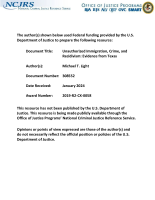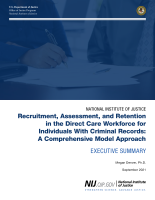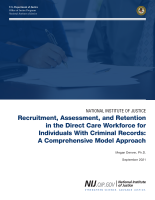Conviction Records
Targeting the "Absence" in a Desistance Framework: Balancing Risk and Rehabilitation in Mandated Criminal Background Check Employment Decisions
Outcome Evaluation of Jail-Based Drug Treatment: Effects on Recidivism
Effects of Instituting Means-Based Fines in Criminal Court: The Staten Island Day-Fine Experiment, Final Report
Reducing Collateral Consequences with Records Relief: Organizational Readiness for Implementing Strategies in State Courts
Unauthorized Immigration, Crime, and Recidivism: Evidence from Texas
Inclusive Research: Engaging People Closest to the Issue Makes for Better Science & Greater Impact; 2023 NIJ Research Conference Plenary
This panel will discuss what inclusive research is, how to conduct it, and what issues and challenges exist about engaging in it. “Inclusive research” has its history as a participatory research method designed to ensure people closest to the issue or problem under study are authentically engaged in the research process rather than simply being “research subjects.” While community-based participatory research has begun to take on greater prominence in the criminal justice realm, such efforts are largely confined to qualitative research inquiries.
See the YouTube Terms of Service and Google Privacy Policy
Technical Advances in Background Checking and the Impact on Work Opportunities in New Jersey
The Hidden Costs of Reentry: Understanding the Barriers to Removing a Criminal Record
NIJ hosted a webinar to discuss under-researched aspects of reentry: expungement of criminal records and the impact of those records. This webinar includes a presentation of ongoing research projects examining the impact of legal aid for expungement and past research projects studying the accuracy and permanency of criminal records and the prevalence of collateral consequences of conviction. A Q&A session will conclude this webinar.
See the YouTube Terms of Service and Google Privacy Policy
Desistance From Crime: Implications for Research, Policy, and Practice
Most scholars would agree that desistance from crime – the process of ceasing engagement in criminal activities – is normative. However, there is variability in the literature regarding the definition and measurement of desistance, the signals of desistance, the age at which desistance begins, and the underlying mechanisms that lead to desistance. Even with considerable advances in the theoretical understanding of desistance from crime, there remain critical gaps between research and the application of that research to practice.
See the YouTube Terms of Service and Google Privacy Policy
Gang Affiliation and Prisoner Reentry: Discrete-Time Variation in Recidivism by Current, Former, and Non-Gang Status
Recruitment, Assessment, and Retention in the Direct Care Workforce for Individuals with Criminal Records: A Comprehensive Model Approach, Executive Summary
Recruitment, Assessment, and Retention in the Direct Care Workforce for Individuals with Criminal Records
School Safety Considerations for Distinct Student Populations - Breakout Session, NIJ Virtual Conference on School Safety
On February 16-18, 2021, the National Institute of Justice hosted the Virtual Conference on School Safety: Bridging Research to Practice to Safeguard Our Schools. This video includes the following presentations:
See the YouTube Terms of Service and Google Privacy Policy
An Experimental Evaluation of the Phoenix Repeat Offender Program
Assessing the Impact of Statutory Change: A Statewide Multilevel Analysis of Restitution Orders in Pennsylvania
Prosecution and Conviction Rates for Intimate Partner Violence
ANALYSIS OF THE TYPE OF CRIMINAL ACTIVITY USING THE LOGIT MODEL
Evaluating the Impact of Prior Record on Judges' Sentencing Decisions - A Seven-City Comparison
Going Home (or Not): How Residential Change Might Help the Formerly Incarcerated Stay Out of Prison
Dr. Kirk discusses how Hurricane Katrina affected those formerly incarcerated persons originally from New Orleans and their likelihood of returning to prison. Kirk also discussed potential strategies for fostering residential change among those who were incarcerated, focusing specifically on parole residency policies and the provision of public housing vouchers.
See the YouTube Terms of Service and Google Privacy Policy
Alternative Sentencing Policies for Drug Offenders
The panel presentations from the 2009 NIJ Conference are based on an NIJ-sponsored evaluation of the effectiveness of Kansas Senate Bill 123, which mandates community-based drug abuse treatment for drug possession by nonviolent offenders in lieu of prison.
Consequences of a Prison Record for Employment: How Do Race, Ethnicity & Gender Factor In?
Scientific studies have long documented the negative impact of a prison record on a person's ability to find employment. But what is the impact when gender and race/ethnicity are factored in? Also, most jobs are now advertised online — so how does this affect the ability of former prisoners to find a job?
See the YouTube Terms of Service and Google Privacy Policy





